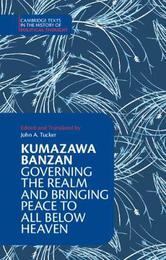
|
Kumazawa Banzan: Governing the Realm and Bringing Peace to All below Heaven
Paperback / softback
Main Details
Description
Kumazawa Banzan's (1619-1691) Responding to the Great Learning (Daigaku wakumon) stands as the first major writing on political economy in early modern Japanese history. John A. Tucker's translation is the first English rendition of this controversial text to be published in eighty years. The introduction offers an accessible and incisive commentary, including detailed analyses of Banzan's text within the context of his life, as well as broader historical and intellectual developments in East Asian Confucian thought. Emphasizing parallels between Banzan's life events, such as his relief efforts in the Okayama domain following devastating flooding, and his later writings advocating compassionate government, environmental initiatives, and projects for growing wealth, Tucker sheds light on Banzan's main objective of 'governing the realm and bringing peace and prosperity to all below heaven'. In Responding to the Great Learning, Banzan was doing more than writing a philosophical commentary, he was advising the Tokugawa shogunate to undertake a major reorganization of the polity - or face the consequences.
Author Biography
John A. Tucker is a professor of history at East Carolina University in Greenville, North Carolina. He specializes in early modern Japanese Confucianism and its varied roles in the intellectual history of Japan. He is the author of The Forty-Seven Ronin: The Vendetta in History (2018), as well as translation studies of Ito Jinsai's Gomo jigi (1998) and Ogyu Sorai's Bendo and Benmei (2006). He co-edited Dao Companion to Japanese Confucian Philosophy (2014) with Chun-chieh Huang, and edited a four-volume series, Critical Readings on Japanese Confucianism (2013).
|